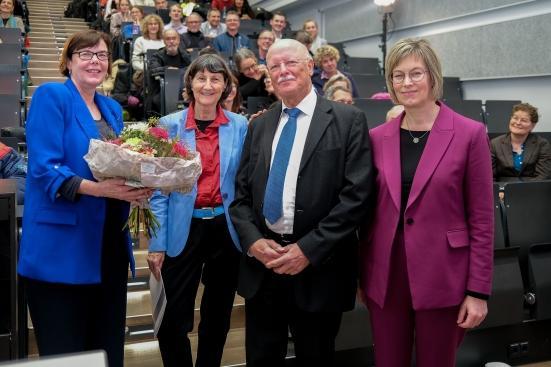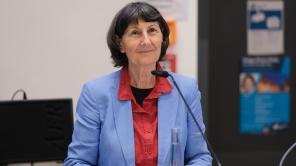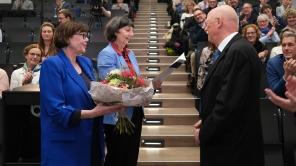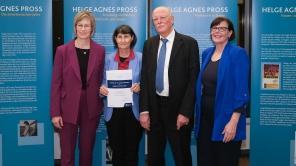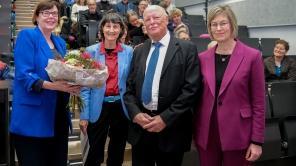A plea for freedom, democracy and gender diversity
The University of Siegen has awarded Prof. Dr. Andrea Maihofer the Helge-Pross Prize. She received her certificate in a festive setting in the Lecture Hall Center on the Lower Castle Campus. Birgit Wehrhöfer, Head of the Department for Equality in the Ministry for Children, Youth, Family, Equality, Refugees and Integration of the State of North Rhine-Westphalia, and her laudator, Prof. Dr. Michael Meuser from TU Dortmund University, congratulated her on her award. "I feel very honored and was delighted when I heard about the prize," said Prof. Andrea Maihofer. The Helge Pross Prize is awarded by the University of Siegen for outstanding achievements in the field of family and gender research and is endowed with 5,000 euros.
Pioneering work in gender and family research
On behalf of the Rectorate of the University of Siegen, Prof. Dr. Petra M. Vogel, Prorector for Students and Junior Faculty, Diversity and International Affairs at the University of Siegen, welcomed Prof. Andrea Maihofer as the eighth winner of the Helge-Pross-Prize. In her welcoming address, Birgit Wehrhöfer congratulated the prizewinner on her academic life's work. "Equality, gender studies and the examination of diversity cannot be taken for granted today in a socially and politically tense time. They have laid important foundations for the critical examination of gender roles and family images as well as for social expectations of gender and families. They have opened up spaces for thought, reflection, discourse and change."
About the award winner
Prof. Andrea Maihofer was Professor of Gender Studies at the University of Basel from 2001 until her retirement in 2020. At the same time, she founded and directed the Center for Gender Studies and the Gender Graduate College. From 2010 to 2018, she also served as President of the Swiss Society for Gender Studies (SGGF). Born in Fribourg in 1953, she studied philosophy, German and education. Her doctorate in philosophy was followed by her habilitation in sociology on the topic of "Gender as a mode of existence" at Goethe University in Frankfurt am Main in 1996. Her research interests include the change and continuity of family and gender relations, social and legal theory, socialization, sexuality and research into men and masculinity.
The recognition of Andrea Maihofer's academic work on this evening is reciprocal: laudator Prof. Dr. Michael Meuser, Professor of Sociology of Gender Relations at TU Dortmund University until 2020, was also a Helge Pross Prize winner in 2004 - Prof. Andrea Maihofer gave his laudatory speech at the time. "It is a great honor for me to be able to give something back today. This closes the circle," said a delighted Prof. Michael Meuser.
Milestones for the establishment of gender studies in German-speaking countries
In his speech, Prof. Meuser emphasized that Prof. Maihofer had contributed important milestones to the networking of gender studies in German-speaking countries - this not only had a great influence on the establishment of gender studies as an academic discipline, but also enabled gender studies to find its way into social and political practice. The Helge Pross Prize is intended to honor both first-class and innovative research as well as socio-political or university-political commitment. Prof. Andrea Maihofer's work fulfills all of these criteria to a high degree. Her work encompasses family and gender research in equal measure - but she does not do this in an additive way, but by working out the inseparable interweaving of family and gender relations. "Andrea Maihofer has repeatedly provided impulses that have given new directions to debates in gender studies. Her research is always motivated by the desire to explore the possibilities of emancipatory practice and a fairer society. This links her to the prize's namesake, Helge Pross," said Prof. Meuser.
Right-wing populism and the rejection of gender diversity
In her keynote speech, Prof. Andrea Maihofer spoke about the close connection between right-wing populism and the rejection of gender diversity - an issue that is currently the subject of much political debate and a threat to gender diversity. Based on a quote from AfD politician Björn Höcke, Maihofer discussed the reasons why right-wing populists in Germany feel robbed of their masculinity and defensiveness and which social developments are triggering this "crisis of masculinity". In her presentation, the prizewinner explained in a level-headed, well-founded manner and with clever conclusions that right-wing populist men are experiencing a loss of power due to gender pluralism, migration, equality and ultimately the deconstruction of male superiority, which leads to anger, hatred and the rejection of alternative life plans. "It is not just about women's issues and the rejection of the feminine, but about the rejection of the multiplication of gender. Individuals are to be forced into and back into the binary gender order," emphasized Prof. Andrea Maihofer and made it clear that it is not masculinity that is under threat, but the freedom of each individual and democracy.
Georg Teichert (Fernuni Hagen) moderated the program. The award ceremony was musically framed by three piano and vocal pieces full of "female power" by Stephanie
Neigel (LfbA Music University of Siegen) and music student Nelli Luges.
Background
The Helge Pross Prize is awarded by the University of Siegen. The winners are selected by a jury from the Prorectorates for Young Academics, Diversity and International Affairs in cooperation with the Center for Political and Sociological Education in the Department of Social Sciences (POLIS), the Siegen Center for Gender Studies (Gestu_S) as well as the Equal Opportunities Officer and the Department of Social Sciences at the University of Siegen.
The prize is dedicated to the research of the Siegen sociologist Helge Pross, who died in 1984. Helge Pross taught as a professor at the University of Siegen from 1976 to 1984 and is considered a pioneer of family and gender research. She was interested in researching the reality of life for housewives, the educational opportunities of girls and the role models of men.
